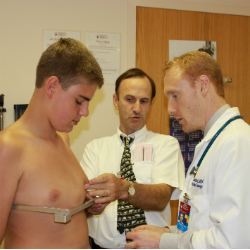New Clinic Specializes in Chest Wall Disorders in Children

The two most common types of the disorder, pectus excavatum (a caved-in sternum or funnel chest) and pectus carinatum (a protrusion of the chest wall or pigeon chest) result when the ribs and sternum develop in an unusual manner. Mild deformities often are not discovered by physicians unless children are referred for coincidental scoliosis. If not treated adequately, patients may experience shortness of breath, low endurance and frequent respiratory difficulties. More severe chest deformities may lead to thoracic insufficiency syndrome, which have significant impact of an infant's ability to grow and to develop normally. At the end of the spectrum one may find an extremely rare condition known as asphyxiating thoracic dystrophy (Jeune Syndrome).
“These deformities are often silent sources of major distress for the growing child and teenager, as well as his or her family”, says Sherif Emil, M.D., director of paediatric General surgery at McGill and the Montreal Children’s Hospital and the physician who envisioned the new center. “Pediatricians and family doctors often dismiss the anomaly, believing that the only treatment is radical surgery. However, in the last decade there has been a revolution in the treatment of these anomalies with many minimally invasive and less invasive options available,” he adds.
The first one of its kind in Canada, and one of few such centers in North America, the Chest Wall Anomaly Centre’s multidisciplinary team is composed of pediatric general surgeons, orthopaedic surgeons, pulmonologists, pediatricians, nurses, physiotherapists, medical imaging specialists and orthotists, with additional services as needed offered by plastic surgeons, cardiologists, and geneticists. According to Jean A. Ouellet, M.D., deputy chief of staff at Shriners Hospitals for Children — Canada, “Our multidisciplinary team will develop a center of excellence by concentrating all of our expertise in a one-stop center for treatment diagnosis and evaluation.”
The team aims to provide state-of-the-art care for the entire range of chest wall anomalies in a family-centered environment that aims to optimize patient comfort and satisfaction. New technologies, such as the dynamic compression brace, will allow physicians to offer therapy for pectus deformities without surgery in many cases. In addition to fitting, adjusting and follow-up care for patients’ braces and surgeries, the team will collect data on the various types of treatments in order to evaluate results and continue to improve care.
To refer a child to the Chest Wall Anomalies Clinic, pediatricians, physicians and families across Canada can contact Shriners Hospitals for Children – Canada at 1-800-361-7256.
About Shriners Hospitals for Children
Shriners Hospitals for Children is changing lives every day through innovative pediatric specialty care, world-class research and outstanding medical education. The 22 hospitals in the United States, Canada and Mexico provide advanced care for children with orthopaedic conditions, burns, spinal cord injuries, and cleft lip and palate. For more information visit www.shrinershospitalsforchildren.org.
Shriners Hospitals for Children is a 501(c)3 non-profit organization and relies on the generosity of donors. All donations are tax deductible to the fullest extent permitted by law.


